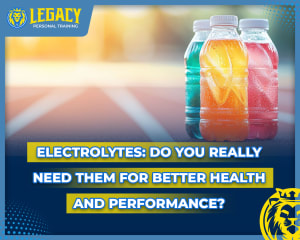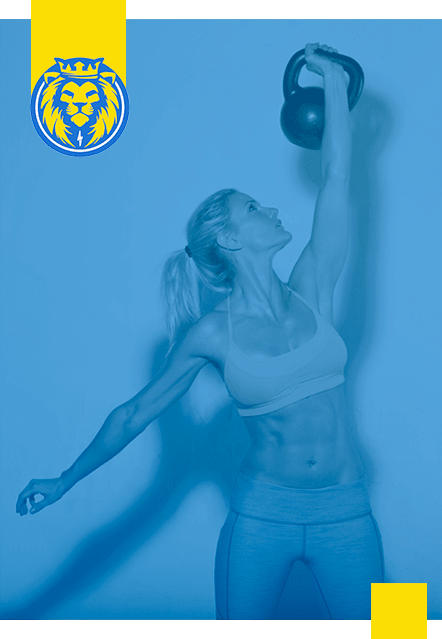
Electrolytes are one of those buzzwords you see everywhere. Walk down the beverage aisle and you’ll find dozens of drinks and powders promising more energy, faster recovery, and better hydration. Athletes swear by them, supplement companies market them aggressively, and people often assume they’re essential for every workout. But are electrolytes really necessary for you? Or are they another overhyped wellness product? At Legacy Personal Training, we help clients focus on what actually matters for performance, longevity, and fat loss. In this article, we’ll break down what electrolytes really do, who benefits most from them, and how to choose the right option if you decide to supplement. Electrolytes are minerals in your body that carry an electric charge. They’re essential for life because they allow your cells to communicate, your muscles to contract, and your heart to beat. The main electrolytes include: Sodium: Regulates fluid balance, blood pressure, and nerve signaling. Potassium: Critical for muscle contractions, including your heart. Magnesium: Helps with relaxation, recovery, and over 300 biochemical processes. Calcium: Supports bone health and plays a role in nerve and muscle function. Chloride and phosphate: Help maintain pH balance and fluid levels. Think of electrolytes as the body’s wiring system. Without them, your muscles would spasm, your brain would struggle to send signals, and even your heartbeat could become irregular. The short answer: it depends. If you’re going for a 30-minute walk, a light strength session, or a short yoga class, water is usually all you need. Electrolytes become useful when: You sweat a lot: Sweat contains sodium, potassium, and magnesium. If you’re training in Arizona heat (hello Arizona summers), you’re losing electrolytes fast. Your workout is long: Training for over an hour, especially endurance sports like running, cycling, or swimming, depletes electrolyte stores. Your workout is intense: High-intensity strength training, HIIT, or conditioning workouts push your nervous system and muscle firing capacity. Electrolytes help maintain performance. You follow a low-carb diet: Carbohydrates help the body hold onto water and electrolytes. Without carbs, you lose more sodium and potassium, which can cause fatigue and cramping. For these situations, replacing electrolytes can help you stay energized, avoid cramps, and recover faster. Here’s where it gets tricky. More isn’t always better. Electrolyte supplements aren’t necessary for everyone, and in some cases, they can be harmful: People with high blood pressure: Too much sodium can increase blood pressure and strain the heart. Individuals with kidney disease: Kidneys regulate electrolyte balance. If they’re not functioning properly, supplements can throw things off People who don’t exercise intensely: If you’re only doing light activity, you’re probably getting enough electrolytes from food. Always check with your doctor if you have underlying conditions before adding electrolyte supplements. When used appropriately, electrolytes can make a noticeable difference in how you feel and perform. Here’s what you might experience: Better Hydration: Electrolytes help your body actually use the water you drink. Without sodium and potassium, water can pass right through you without hydrating cells effectively. Reduced Muscle Cramps: Cramping during workouts often comes from low sodium, magnesium, or potassium. Balanced electrolytes can reduce these frustrating interruptions. Sustained Energy: By supporting nerve and muscle function, electrolytes keep your performance from dropping off in the middle of training. Improved Recovery: After a tough session, replenishing lost minerals helps restore normal function and reduce lingering fatigue. Heart and Nervous System Support: Sodium-potassium balance is literally what makes your heartbeat possible. This balance also helps prevent dizziness and lightheadedness. For clients over 40, we often see electrolyte balance become even more important. As we age, the body doesn’t regulate fluids and minerals as efficiently. Combine that with nagging injuries, poor sleep, or medications that affect hydration, and electrolytes can make a real difference in energy and recovery. You don’t always need a blood test to know if you’re running low. Here are some common signs that electrolyte support might help: Frequent muscle cramps during or after workouts Dizziness or lightheadedness when standing up quickly Extreme fatigue even after a normal workout Headaches that come with dehydration Dark urine or low urine output despite drinking fluids If you’re checking several of these boxes, it may be worth adjusting your diet or trying a supplement. Before reaching for a supplement, remember that food can provide plenty of electrolytes. Some excellent options include: Sodium: Pickles, olives, lightly salted nuts Potassium: Bananas, sweet potatoes, avocados, beans Magnesium: Pumpkin seeds, almonds, spinach, dark chocolate Calcium: Dairy, leafy greens, sardines For many people, simply eating more nutrient-dense foods can cover the bases. Supplements are most useful when training is long, sweaty, or demanding. If you decide to use an electrolyte supplement, quality matters. Here’s what we recommend at Legacy: Low Sugar Content Balanced Sodium and Potassium Include Magnesium Avoid Artificial Additives Match Your Needs Electrolytes are essential for life, but whether you need to supplement depends on your activity level, environment, and diet. If you’re training hard, sweating often, or noticing frequent cramps, they can be a game-changer. If you’re lightly active, eating whole foods, and staying hydrated, you probably don’t need a daily electrolyte drink. At Legacy Personal Training, we help our clients cut through the hype and use tools like electrolytes strategically—not as a crutch, but as part of a smart training and nutrition system. Hydration, recovery, and strength training are the cornerstones of long-term health and performance. Electrolytes can support all three when used correctly, but they’re only one piece of the puzzle. If you want a program designed to fit your body, your lifestyle, and your goals, we’re here to help. Legacy Personal Training proudly serves DC Ranch and the North Scottsdale community. 📅 Book your consultation today and discover how our expert team can design a fitness and nutrition plan that keeps you hydrated, energized, and moving strong for years to come.Electrolytes: Do You Really Need Them for Better Health and Performance?
What Are Electrolytes and Why Do They Matter?
Will Electrolytes Actually Help Exercise?
Who Should Be Cautious with Electrolytes?
Benefits of Proper Electrolyte Intake
How Do You Know If You’re Getting Enough Electrolytes?
Whole Food Sources of Electrolytes
What to Look for When Buying Electrolytes
Many sports drinks are basically soda with minerals. Choose powders or tablets with little to no added sugar unless you’re doing endurance training where quick carbs are needed.
These two work together to regulate hydration and nerve firing. Make sure both are present in meaningful amounts.
Many mixes leave magnesium out, but it’s essential for recovery and relaxation.
Skip products with artificial dyes, sweeteners, and fillers. Look for clean, simple ingredient lists.
Endurance athletes often need higher sodium. Strength athletes may do better with balanced blends that also include magnesium.The Bottom Line on Electrolytes
Ready to Train Smarter and Recover Better?

